[Omar] SNUH newsletter interview Q and answers
Q1. Could you briefly introduce yourself and your professional background?
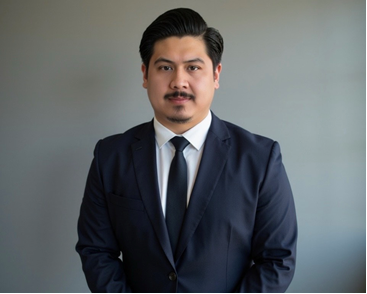
My name is Dr. Omar Sulaiman, and I am a consultant urologist at King Fahd Hospital in Jeddah, Saudi Arabia. I completed my five-year residency training in urology through the Saudi Board of Urology, and subsequently worked for three years as a senior registrar(equivalent to a clinical fellow), gaining extensive clinical and surgical experience. I was then promoted to consultant urologist, a position I continue to hold.
Currently, I am a visiting fellow in the Department of Urology at Seoul National University Hospital (SNUH), where my training focuses on endourology and minimally invasive surgical techniques. My main clinical and research interests include advanced management of urinary stone disease, minimally invasive approaches for benign prostatic hyperplasia (BPH), and robotic urological surgery.
Q2. How did you first learn about SNUH and why did you choose to come here for your fellowship?
I first learned about SNUH through colleagues and its strong international reputation in urology. My fellowship was made possible through a formal agreement between Saudi Arabia and the Korea Health Industry Development Institute (KHIDI), in which SNUH is one of the participating training centers.
I chose SNUH because of its advanced technology, high-volume clinical training, and the opportunity to learn from distinguished faculty in a world-class academic and research environment.
Q3. What kind of activities are you involved in during your fellowship at SNUH?
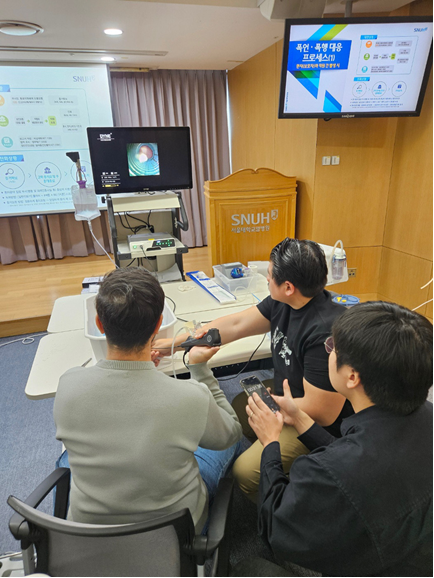
During my fellowship at SNUH, I have been actively engaged in both clinical and academic activities. Clinically, I gained exposure to advanced urological procedures, including RIRS, robotic RIRS, mini PCNL, ECIRS, and BPH surgeries such as Holmium Laser Enucleation of the Prostate(HoLEP), bipolar HoLEP, and Rezūm. I also participated in robotic surgeries, including robotic pyeloplasty and reconstructive procedures, using both the Da Vinci and Hugo platforms.
Academically, I contributed to multiple clinical research projects and animal experimental studies. Several of these works have been published in high-impact journals, others submitted as abstracts, and I had the privilege of presenting at international conferences. I also actively participate in journal clubs and academic meetings, which continue to enrich my training.
Q4. What are the most memorable or impressive experiences you have had during your stay at SNUH?
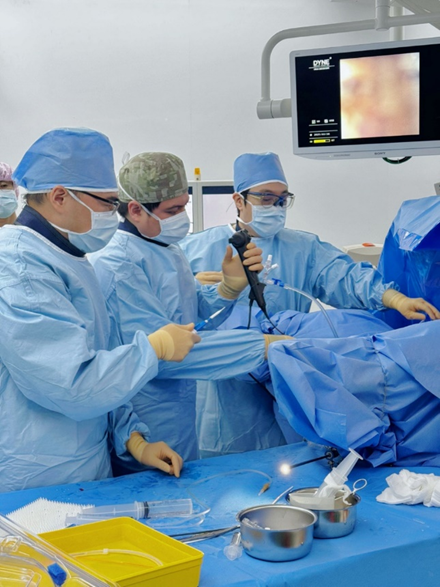
One of the most memorable experiences during my fellowship at SNUH has been witnessing the advanced technology and high standards of the operating rooms, which reflect the hospital’s remarkable commitment to surgical excellence. I was also deeply impressed by the exceptional teamwork between surgeons, nurses, and staff, who treat every patient with the utmost care.
Another unforgettable aspect has been the culture of respect within the department, particularly toward senior faculty and professors. I have had the privilege of working alongside world-renowned pioneers in urology, and I was struck not only by their expertise but also by how supportive and approachable they are. These experiences have been both inspiring and transformative in my professional journey.
Q5. How would you describe the mentorship and academic atmosphere here?
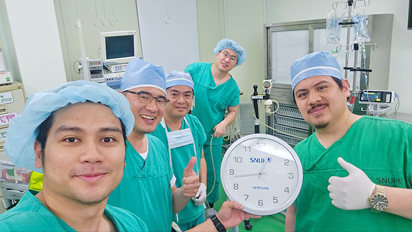
The mentorship and academic atmosphere at SNUH are exceptional. Senior professors provide strong guidance and are always supportive, fostering an environment of respect, professionalism, and collaboration. The department actively encourages academic growth through research involvement, journal clubs, and case discussions, creating an open and stimulating environment for learning. As an international fellow, I have felt fully welcomed and included, which has greatly enriched my training experience.
Q6. How do you plan to apply what you learned at SNUH when you return to your home institution?
When I return to my home institution, I plan to apply the advanced surgical techniques I have learned at SNUH, particularly in endourology, minimally invasive BPH procedures, and robotic surgery. I have also gained valuable tips and tricks that make surgical practice more efficient, cost-effective, and safe for patients.
In addition, I intend to share this knowledge with my colleagues and trainees, helping to raise the standard of urological care and promote a stronger academic and training environment in my department. The lessons I have learned about surgical setup and teamwork will also be crucial in improving outcomes and optimizing resources.
Q7. What has been the most memorable moment in Korea, either inside or outside the hospital?
One of the most memorable moments for me inside the hospital was experiencing the hospitality and kindness of my professor, who not only guided me academically but also genuinely cared for his fellows. His mentorship and support left a lasting impression on me.
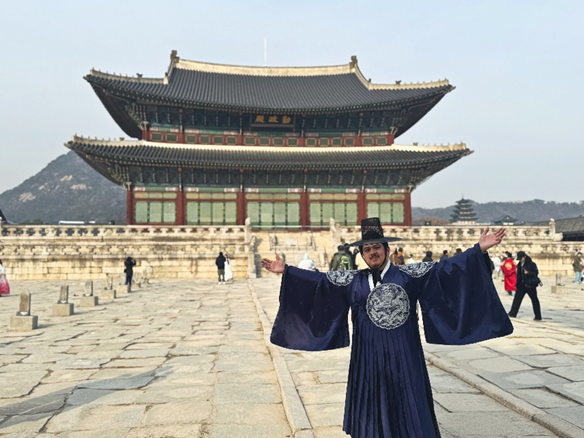
Outside the hospital, I was deeply impressed by Korean culture and traditions. I especially enjoyed trying traditional food such as Korean barbecue, attending festivals, and visiting cultural landmarks. Experiencing the beauty of nature, particularly during the cherry blossom season, gave me a rich appreciation of the country’s heritage.
Q8. Would you recommend SNUH’s International Fellowship Program to other doctors in your country? If yes, why?
Yes, I would strongly recommend SNUH’s International Fellowship Program. The training provides exceptional exposure to advanced surgical techniques, cutting-edge technology, and structured training modules, along with a high volume of cases managed in a smooth clinical flow. This is supported by excellent operating room staff and anesthesia teams, which greatly enhance the learning experience.
Equally important, the mentorship from world-class faculty combines surgical excellence with genuine support and approachability. The program also offers valuable opportunities for research, academic growth, and international collaboration, all within a welcoming environment for fellows. This makes the fellowship a truly transformative experience.
Q9. Do you have any advice for future international fellows who may come to SNUH?
My advice for future international fellows is to come with an open mind and take full advantage of the unique opportunities at SNUH. The hospital offers exposure to high surgical volumes, advanced technology, and world-class mentorship, all of which can greatly enhance professional growth.
I would encourage fellows to actively participate in clinical practice, research projects, and academic activities such as journal clubs and conferences. At the same time, embracing Korean culture and daily life outside the hospital will make the fellowship experience even more rewarding. Finally, building strong relationships with colleagues and mentors is invaluable, as the guidance and support you receive here will have a lasting impact on your career.